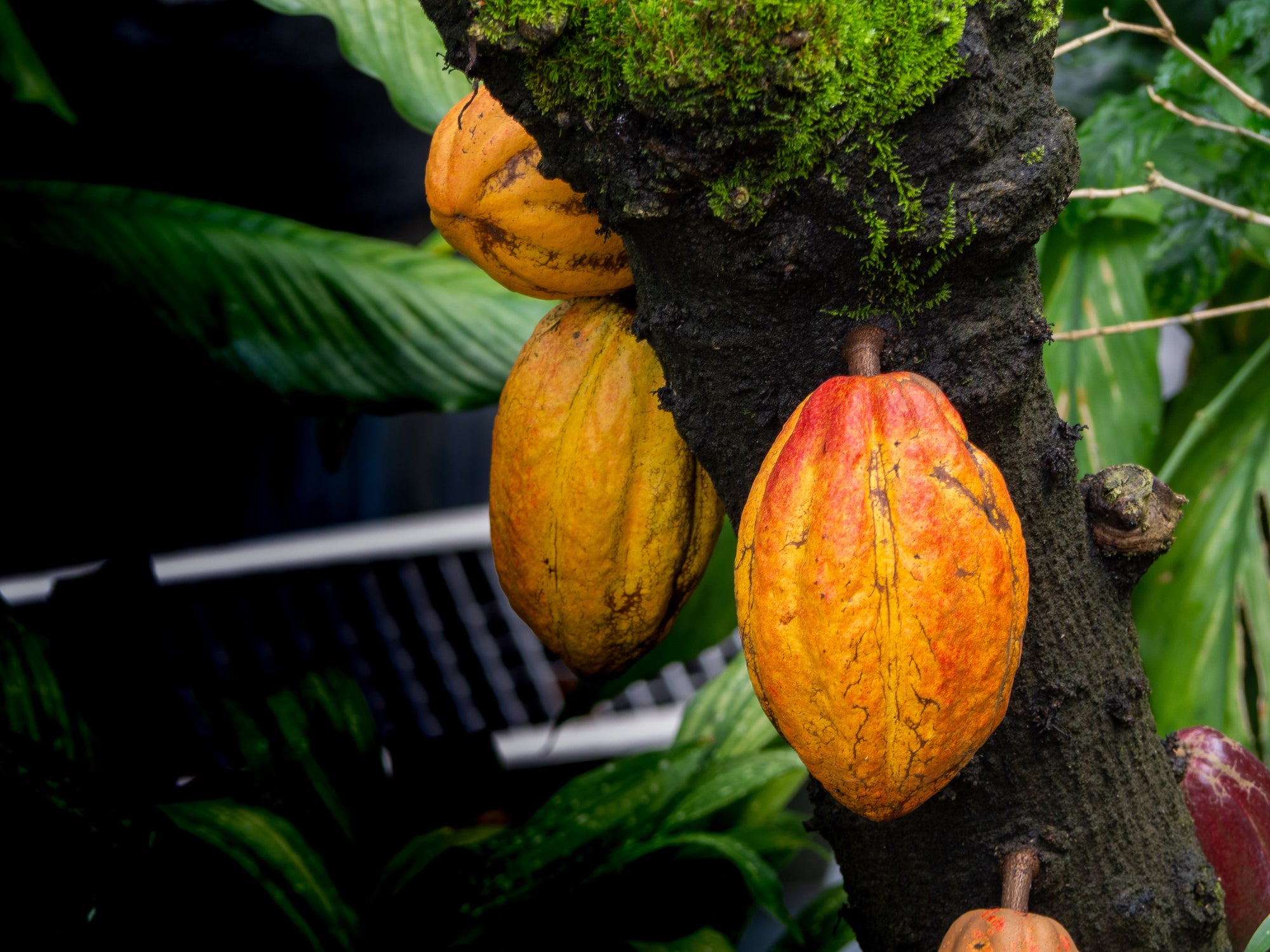Chocolate is everyone's favourite sweet treat. But big players in the chocolate world are
causing environmental harm. And it's not just the natural world that's under threat. Cocoa farmers and their families are being exploited by mainstream chocolate production — all because we can't get enough of a quick chocolate fix.
At Love Cocoa, we’re committed to making sustainable chocolate that’s good for the planet. So we’ve taken a closer look at the environmental dangers of mainstream chocolate production to find out how sustainable cocoa farming can create ethical chocolate.
What do we mean by mainstream chocolate production?
Mainstream chocolate is the bar you grab at the checkout or the service station till. It's cheap, sweet, and delivers a quick sugar fix. But it’s often made from poor-quality beans that aren't adequately sorted or graded. And because the chocolate is produced in bulk, you don't notice the flavour of the low-grade or rotten beans in the mix.
So why are such practices allowed to continue? The problem is that mainstream chocolate production treats cocoa beans as a commodity. So instead of buying for quality, beans are traded for quantity at the lowest price. And the confectionery giants profit from keeping costs as low as possible, while the cocoa farmers receive just a fraction of the profit from end sales.
As a result, modern slavery and child exploitation in the cocoa industry are rife. Large, multi-national chocolate companies claim that, with so many go-betweens, it's impossible to monitor their entire supply chains. At Love Cocoa, we say that's not good enough.
What damage is the mainstream chocolate industry causing?
So what damage is our craving for cheap chocolate doing to cocoa farmers and the environment? It’s a vital cash crop for many cocoa farmers in West Africa who own just a few acres and are forced to maximise their profitability.
In addition, one of the most significant issues facing the mainstream chocolate industry is the surge in global demand and the failure of producers to keep pace. Worryingly, many of the world's biggest cocoa plantations are already past peak production, and it can take up to five years for a new cacao tree to produce fruit.
Deforestation
Most of today’s cacao crop is grown as a monoculture. The result is degraded soil lacking in nutrients, leading to a heavy reliance on chemical fertilisers and pesticides.
Then instead of improving existing land, cocoa farmers clear tropical forests for new plantations. In the Ivory Coast alone, an estimated 70% of illegal deforestation is linked to cocoa farming. And an estimated 17% of cocoa is illegally produced.
And it’s not only the natural world that suffers as a result of deforestation. Rural communities that depend on natural forests face food insecurity and loss of livelihood.
Poor treatment of cocoa farmers
The global chocolate industry may be worth an estimated US$113 billion. But cocoa farmers still struggle to be paid a living wage.
And that leaves them vulnerable to being trafficked by unscrupulous individuals who promise entire families lucrative jobs and the chance of a better life. The reality is often dangerous and poorly paid work in terrible conditions.
An estimated 2.1 million children — some as young as five — currently labour on cocoa farms in West Africa. And with massive profits to be made as a result of our insatiable craving for cheap chocolate, there's no desire among mainstream chocolate producers to change the system.
Environmental damage and biodiversity loss
Why is deforestation caused by cocoa farming such an environmental disaster?
First and foremost, protecting trees is essential to meet our climate change commitments. Forests are vital for carbon capture, and deforestation contributes to global warming by turning carbon sinks into carbon emitters.
Deforestation has a catastrophic impact on natural habitats, leading to biodiversity loss and the destruction of entire ecosystems. Forests are home to an estimated 80% of land-based wildlife. And deforestation ruins wildlife habitats, resulting in irreversible species loss and affecting 85% of animals on the IUCN Red List. That’s over 28,000 species that could become extinct in just 25 years.
In addition, disrupted weather patterns result in soil degradation as vital nutrients are washed away. The loss of natural organic matter results in land that can no longer sustain plant, animal or human life.
Sustainable chocolate: how Love Cocoa is changing the game
But it doesn’t have to be that way. Producing sustainable and ethical chocolate is possible. And at Love Cocoa, we're helping to change the game regarding sustainable cocoa farming. We're one of several modern chocolate brands committed to giving back to cocoa farmers and the planet.
So what are we doing to shift the dial? Currently, we’re involved in three critical initiatives to create a more sustainable chocolate brand:
Eco-conscious, small-scale cocoa farming
We take steps to only work with small-scale cocoa farmers. Farmers who are as passionate about sustainability and the environment as we are.
For example, the Colombian beans for our single-origin bars come from a family-run producer in Bogota. They committed to being carbon-neutral across their entire operation in 2021. And we’re proud to work with them to reduce C02 emissions for sustainable cocoa farming.
In addition, they're committed to reforesting an area of 1,400,000 hectares by 2030. This initiative will help rewild the area, encouraging the return of wildlife and promoting biodiversity. And while it's not an instant fix, we're supporting them to work towards a long-term solution.
Fair pay and treatment for our cocoa farmers
But being an ethical chocolate brand is about more than sustainability. It's about working directly with our suppliers to ensure our farmers are paid fairly for their crops. Additionally, we pay over the market price for our beans.
And it's not just about money. Our commitment to being an ethical chocolate brand extends to the relationships we foster with our suppliers. We nurture long-standing and respectful partnerships with the farmers we work with.
And we support the Forest Garden Training Approach. This Trees for the Future initiative helps cocoa farming communities increase their income and improve health and well-being.
Plant a Tree project
You've probably already noticed that when you buy a Love Cocoa bar, one tree is planted with your purchase. And we're incredibly proud of our One Bar = One Tree project, which has already planted over one million trees to fight climate change.
We partner with Eden Reforestation Projects, a nonprofit NGO working alongside cocoa farming communities. Their projects have multiple benefits - by restoring natural landscapes, they combat climate change, provide good jobs, and protect ecosystems and wildlife habitats.
So for every bar you buy from us, you're helping families transition away from exploitation and unsustainability. As a result, we can continue to create sustainable, ethical chocolate. And you can enjoy your favourite bar knowing you support sustainable cocoa farming.


